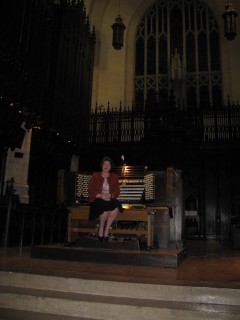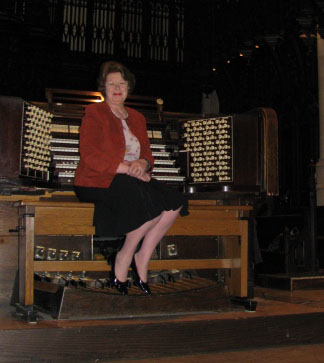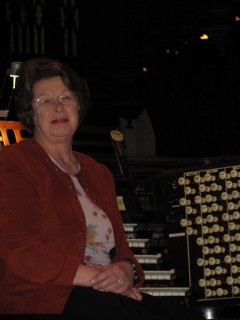Toronto Concert June 30 2009
Gala Concert brings master organist Gillian Weir full circle
Royal Canadian College of Organists Celebrates 100th anniversary with major international organ festival
On Friday May 1 this year, I listened to Dame Gillian Weir, master organist, give a breathtaking recital, jet-lag be damned, to open the fourth annual ORGANIX festival, on Casavant Organ Opus 3095, newly installed in Holy Trinity Church, in the shadow of the Eaton Centre. The following morning I caught up with her for a whirlwind interview, a few blocks east, at the console of Metropolitan United Church's mighty Casavant Opus 1367, en route to the airport on her way back home to England.
Between those two organs hangs this particular tale.
Casavant Opus 3095, now nestled at Holy Trinity, is one of Dame Gillian Weir's favourite instruments. It was largely the work of master organ builder Lawrence Phelps, Gillian Weir's husband for nigh on 30 years, and was installed at Deer Park United Church in 1970, barely a year after her first North American recital and about the same amount of time before their marriage. Upon the demise of Deer Park United, the organ could well have suffered the same fate but, as Dame Gillian put it, "it's a lucky organ to have found a new home" in a place where it sounds if anything better than before, and where it stands a good chance of becoming part of the daily life of an active and activist congregation. "It’s clear that everybody there loves it,” says Weir. “The priest in charge is an organist; Becca Whitla (Holy Trinity music director) is an extraordinarily thoughtful person with ideas about how to treat this organ. It was important for me to be here."
The very good news is that Dame Gillian will be back in Toronto sooner rather than later: June 30, at the keyboard of Casavant 1367 at Metropolitan United, she will headline the gala concert that is the highpoint of the Royal Canadian College of Organists International Organ Festival. The festival coincides with the RCCO's one hundredth anniversary, making it, after the Women's Musical Club of Toronto, the oldest continuously active musical organization in this part of the world.
So that is why, on this Saturday morning in early May she was at the Metropolitan United organ console, making careful notes on her score, listening to every sound the instrument was capable of, in order to make the choices that an organist, more than any other musician (except perhaps an orchestral conductor) has to make. As we "rolled tape" she was talking about how touch, and changes of it, are the key to interpretation on the organ:
GW: … constant changes of touch…but they should be from note to note in the way they are a singer, or a good speaker …one of the problems is that people today speak so badly, on a monotone most of the time and with the wrong stresses on syllables because they're so bored, or because they don't see speech anymore as something with which you communicate detail, and communicate feeling, and communicate all kinds of subtleties. Just listen to news readers read with all the stresses on the wrong words. That really is tragic. For the Greeks, oratory was the highest form of art there was. And if you start from there, then inflect this oratory a little bit more, so that it goes up a bit further and down but further, you have song, and that's what we should always go back to, I think, that idea. It doesn't mean that there aren't enormously important principles of performance, and in particular, of only music performance, they are. What gets me is that we have limited those principles to about two things: formularize them so that they no longer mean anything, and made a travesty of them all.
WholeNote: I was struck last night at Holy Trinity how the program you chose put the organ through all its paces …
GW: It's a good way of describing it rather than "demonstrate". I hate that word, demonstration. Well of course I do do that. I do, and that's why I think so carefully about what stops, what kinds of colours are we using in a particular piece, and then have something else following that uses another colour. Of course one does do that, it's part of the performance. Absolutely, It's just when this becomes the be all and end all that it gets to be ...I mean, people have often said to me after a concert, somebody comes up and says "I really like how you've demonstrated the Nazard" and my heart, and the heart of several of the composers is lying there bleeding on the floor, and somebody says "you've demonstrated the Nazard" It's tragic, really, I mean that's a tragic thing to say to somebody, and a tragic thing for them to hear.
WholeNote: That puts me in mind of a story, apocryphal perhaps, of a story about Rodin—he had sculpted a piece, and everyone who saw it went into raptures about the hands. So he took a hammer to the piece, smashed it, because in his words it wasn't about the hands, it was about the totality.
GW: An organ is at its greatest when it transmits the message most magnificently, and then you venerate the organ, because it's done such a wonderful job, but not just because it's got the loudest trumpet in Christendom or whatever. It's a constant paradox because it's so extremely difficult to build an organ this good, and it's extremely difficult to play it, it's almost impossible to do either. The organ is unique in that it is both an artistic, it's sort-of half an artistic venture and half an engineering one. The engineering has to be fantastic, and the artistic thing about an organ is extremely difficult because people hear colours and seek merely to represent those colours on the organ, so you have what I call a 'menu' organ, you've got an oboe and you've got a crumhorn and you've got a trumpet and you've got a diapason, and so on, but they're not thought of in the right relationships. As with all art, whether it's architecture, dance, painting, whatever, relationships, that's what it's all about, it's about relationships and it's about proportion. And on the organ it's extremely difficult, and that's why the proportion of good organs to great organs is rather small.
WholeNote: Why is that, do you think?
GW: Because it's really very bad to make compromises and yet people are often, as they say, forced to make compromises because of the situation in the building; the architect won't let them put it in the place which would be maximal for its effectiveness; or in the service of the church, perhaps it has to be put away in the wrong place. There's an organ in New York which is even in a different postal district than the console! As my husband used to say, compromise makes a second class situation out of a potential first-class one, and that seems to me to be a good enough definition as any.
WholeNote: The distance between instrumentalist and the sound does contribute, sometimes to an alienation of the audience, doesn't it? As, for me I confess, does the almost inevitable church context—it's after all where we're as likely to have heard bad organs badly played. … How does one eliminate the barriers between the audience and instrument?
GW: An organ does sound wonderful in a church that has good acoustics and doesn't have carpet, and so on. And, much of the concert repertoire sprang from that context, even music that we’ve now accepted into the concert hall, as in the cases of the B Minor Mass, the Missa Solemnis—and so much of this music, we listen to it in all kinds of contexts without being rattled by where it came from---just grateful, really, that the Church for so long was the greatest patron of the arts you could possible have, whether it was writing, printing, or, most of all, music. It's just that there’ve been so many situations where you have, say, a harmonium, or a very very inadequate small organ somewhere, and perhaps not very good music, and so for a lot of people, their first experience of an organ is not a good one, and it's a pity.
WholeNote: What was your first exposure to the instrument?
GW: Well, I was 16, and my mother sang in the church choir, the organist was ill or something, and they rang my mother in desperation and said "your daughter plays the piano. Could she come over and possibly play a few hymns for a weekday service?" So, somewhat protestingly I went over and tried to understand this thing which was terrifying because it didn't make any sound until I pulled out a knob, which knob should I pull out, it didn't change much when I touched it. However, I spent the afternoon trying to register a few things, and get them set up, and then I went and put on the hat and gown one had to wear, and I came back and everybody was kneeling quietly (as people did in those days, rather than having a coffee just beforehand or whatever). Anyway, I walked over the pedals. But I had forgotten that I'd left the tilts set up! (I should probably have become a kind of "Victor Borge" of the organ after such a beginning).
WholeNote: You were in still in New Zealand then? And studying piano at the time?
GW: I was playing the piano, I wanted to be a pianist, I loved the piano. But I thought I'd better learn how to play this thing (the organ) if this was going to happen again! But I really became an organist when I was taken to Haarlem, in Holland.
WholeNote: St. Bavon's?
GW: Yes, exactly, a wonderful, wonderful instrument. I won a scholarship to study at the Royal College of Music, and so I had to do two instruments, so I did the piano with Cyril Smith which was a great privilege, a great concert pianist, and the organ with Ralph Downes, a fascinating man. And, Ralph Downes thought I should enter a competition, so I did, rather reluctantly. In fact I didn't go on the day of the competition, I thought, this is pointless. Cyril Smith had, rather rubbished the whole idea. He had total contempt for the organ. But they rang me up half-way through the morning (to ask where I was) and I said 'I didn't think I'd come, it'd be quite pointless, I'm no good, etc.' They said to get up there immediately, I'd been drawn to play last, so I got up there in time, and sat on a graveyard with Peter Herfen, the organist, sitting firmly on top of me, so I didn't escape. I was lucky enough to win it, and went off immediately to Holland, with Ralph who was playing some concerts. He said, 'You must see these organs,' and I spent three hours or so playing, and they said 'You’ve got to go, the tourists are complaining,' and I staggered off the organ saying 'What happened? This is fantastic, this is music, this is wonderful.' And I'd been playing the D Major Prelude and Fugue by Bach, which has a syncopated theme. And on this action, of course, one could hear it. And with the relationships within the instruments, the total relationships of the scaling, you could hear every part of the fugue as if it were marching up the aisle carrying a flag. Marvellous. So I became an organist on the spot.
WholeNote: I was thinking after last night's concert about the new home for the organ at Holy Trinity … how unusual for an organ to become the life of a new building…. And it stands a pretty good chance.
GW: Oh, I think it will, because it's clear that everybody loves it, and they understand it. The priest in charge is an organist. And, (Holy Trinity music director) Becca Whitla is an extraordinarily thoughtful person; she has clearly thought exactly how to treat this organ, and how to make its message known, not ramming it down people's throats but using it in a lot of different ways. I think it’s very lucky to have landed up there, and naturally I have an emotional attachment to it.
WholeNote: It was the instrument Lawrence Phelps was working on when you met …?
GW: That's right, and the organ was very lucky at Deer Park to have such a marvellous musician as William Wright, a superb player, and somebody who understood it totally. And I’m sure it’s a very happy organ that it had such a wonderful life with him. And now it’s been given a chance for another life, a renaissance.
WholeNote: With your marriage to Lawrence Phelps, your life has been spent on both the engineering and the expressive side of your instrument, hasn't it?
GW: To some extent, yes, I’m not very good at what goes on under the bonnet, I wouldn’t like to have to fix anything too much, but naturally being married to somebody who designed 750 organs and knew so much about them, I was immersed in it to some extent. Particularly the action, I think, because if I should happen to be practising on one of Larry’s organs within a few minutes he’d appear and say, ‘Could you just play the cornet for me without any chiff at all, and then with, I want to see if it works.’ He had the most sensitive actions there were anywhere. He was renowned for that, and his 74 stop organ which was put into Oral Roberts University and was a huge four manual organ with big, big scales and so on, had an extraordinarily sensitive action, like a harpsichord.
WholeNote: Speaking of harpsichord, are you turning to it more? Do you do harpsichord concerts?
GW: No, I don’t, it really wouldn’t be possible to really have the repertoire of both instruments. I play so much music, and in the past I have played so many new performances, I just wouldn’t be able to sustain it all. But I find many harpsichordists don’t play many of the modern concertos, and so for a while I did a lot of the modern concertos which didn’t seem to be getting played and I loved. There are plenty of harpsichordists to play the Bach superbly, so I’ve done that once or twice for my own pleasure, but not otherwise. But I love the French classical music too, Couperin, Rameau, and so on. I love that whole era, reading about Louis XIV…wonderful books there are about that period, really entertaining books, too, if anyone wants to get into it easily. Just read Nancy Mitford. She wrote a book called The Sun King, which is perhaps where to start, and she wrote biographies of Madame de Pompadour, and several of the people associated with that age, and they’re hugely entertaining, as all her writing was, but extremely well-researched. She lived at Versailles, she fell totally in love with France, even though she was one of the famous Mitford sisters. But she fell in love with France, fell in love with a Frenchman as well, and lived in Versailles. The other book I absolutely adore is the Memoirs of the Duke de St. Simon. There’s an extract of his diaries and letters, and it’s hugely entertaining. In French classical music, people keep talking on in lectures about le bon gout; Couperin talked about le bon gout, and it’s a little bit misunderstood, I think.. People tend to translate it as ‘good taste’ in the same sense of whether you like ceramic flying ducks on the wall…but he’s really talking about style, and this word is used in a slightly different way. For example, he wrote one piece called Les gouts reunis which means the French and Italian styles brought into one synthesis. But in any case, the duke was wandering around Versailles behind the king who was looking at the gardens about to be laid out again, and the duke remarks on all the things that the king wants and then ends -- ‘that man has no taste.’ It brings the period alive so much. And then you hear all this scheming, the wonderful affairs that are going on behind your fan, the deceptions and at the same time the great fun, and so on, you hear it all in the music, the harpsichord pieces.
WholeNote: So, I c an see we're drawing near the end of our time,so turning to WholeNote magazine for a moment, our magazine goes out to an audience with an enormous appetite for classical music, but an audience, I suspect, that still needs a little nudge in regards to the organ, for some of the reasons we've talked about. How would you administer that particular nudge?
GW: It’s difficult, because I sympathize entirely to a great extent, and I think we hear a lot of very dull music on the organ and if the organ is dull as well, which it often is, and the wrong music is played on it, then of course it’s not going to succeed. I deprecate the fact that a lot of people, particularly young people who have just won a competition or something, say ‘I’m going to make the organ better known.’ I’ve now been hearing that for forty-five years. 
WholeNote: The Beatles on the organ to make it better known.
GW: Exactly, they play non-organ music. How does that help? It’s like saying ‘I’m going to make the trumpet better known, I’m going to play harpsichord music on it.’ If you want people to understand the soul of the organ, then it must be the best music for the organ played as well as one can manage on the best organs and in the best circumstances. Of course explanation helps, it’s no use expecting everybody to just love Messiaen immediately, for example. They’re just bewildered by it if they’re hearing it for the first time. So, one needs to explain something about it, make some program notes which are as interesting as possible. I don’t like the kind of program note that says 'in the third bar it modulates to the submediant major, and is heard in canon in bar 56'—all you want to do when you read that is go home, I think. But what is the composer trying to achieve? What is the feeling of this? That sort of thing helps.
I do think the listener has to make some kind of a step towards the music, and not just sit there and say, ‘okay, convert me.’ Unfortunately that particular attitude is one that we have now in everything. The audience, for most things, is fairly passive and expects to be wooed and overwhelmed with excitement. You see this even with comedians, and so on, who perhaps feel that they are tanking halfway and they’ll say ‘come on, come on, work with me’ to the audience, which always seems to me so strange, because, for me, the essence of humour and wit is that it’s spontaneous, or appears to be, however hard you may have worked on it, a la Oscar Wilde, or whatever. To do that breaks the contract, in a sense, it’s crazy, but that’s one evidence of the fact that audiences expect, they say: Okay, make me laugh. And the same with music: Make me love this. You can’t always do that. Music, really serious music has an argument that goes on through it, and you need to follow it. So it’s half and half.
WholeNote: With an orchestra you know the violins are going to sound like violins. But with any particular organ, as a new listener, there is fascination just with the sounds. Speaking personally, I have trouble, in a song for example, absorbing both the sound and the sense in a first listening. Listening to organ one can become absorbed in the mechanics to the detriment of the music. I've wondered about the idea of playing an unfamiliar piece twice, at the beginning and then again at the end?
GW: I think that’s a wonderful idea. I think you should suggest that to the people here, I think it’s certainly a good idea with a new piece to play it twice, absolutely. I heard the Ives fourth symphony played by the Boston Symphony a few weeks ago, and it’s the most overwhelming work and the most extraordinary piece. There’s dozens of players, there’s two conductors, there’s absolutely everything. There’s chaos, but it’s organized chaos, as always with Ives. But there, too, I just thought what’s happening, what’s going to happen next? The way you’re walking down the street and somebody falls out of a window, you know, it’s a surprise. You’re not going to appreciate the arc of the fall the first time, but if they do it again then you’ll have an aesthetic reaction as well as a horrified one. So I think you’re absolutely right, and this is where, say lunch-hour recitals, where people might play a piece twice, not necessarily because it’s only just been written but because it does have some special effects, would be an excellent idea.
WholeNote: And encouraging return visits to become accustomed to an organ's voices.…
GW: You do need the opportunity to think (although it’s a subconscious thought) about ‘how do I listen.’ Come back, come back. It’s definitely the answer. It’s the answer to everything. I mean, people who listen only to pop music (or subject themselves only to pop music because it isn’t really listening) wonder why we want to go back to music by dead white males and hear it over and over again. But we’re perfectly happy to hear a work a thousand times because we listen to how it’s done, the subtleties and interpretations…the same with any type of significant music.
-30-




